Selling Their Bodies
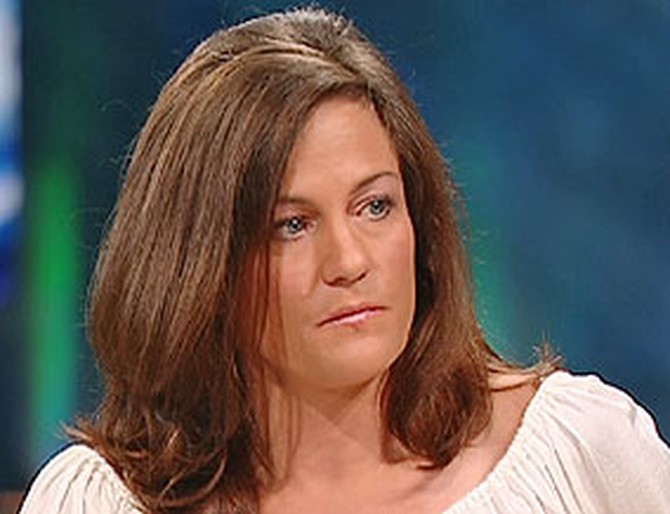
Lisa has been many things in her life—a student at a private all-girls' school, a college student, and a stay-at-home mom. She never thought she'd be shooting crack cocaine in a cheap hotel room and selling her body as a prostitute.
By the time Lisa was 13 years old she says she was using drugs regularly. After dropping out of college, Lisa worked several jobs over the next 10 years, ending up at an advertising firm. All the while she continued using drugs. When she quit her job in 2002, Lisa became homeless and spent her time searching for a way to buy the drugs she could not afford. Lisa was desperate and began prostituting herself, getting clients by running ads in local papers. She says she has lived in this cycle of prostitution and drugs for three and a half years.
It was only after seeing Cracked Not Broken, a documentary about herself filmed by her friend's husband, that Lisa finally realized what her life had become. "I was moved in a way I didn't understand," she says. "I couldn't even put words to the feelings. How did this happen to me?"
Days after seeing the edited version of the documentary, Lisa says she walked out of her hotel room and even left all of her clothes behind. She says she hasn't turned a trick in a month and hasn't used drugs in 16 days.
By the time Lisa was 13 years old she says she was using drugs regularly. After dropping out of college, Lisa worked several jobs over the next 10 years, ending up at an advertising firm. All the while she continued using drugs. When she quit her job in 2002, Lisa became homeless and spent her time searching for a way to buy the drugs she could not afford. Lisa was desperate and began prostituting herself, getting clients by running ads in local papers. She says she has lived in this cycle of prostitution and drugs for three and a half years.
It was only after seeing Cracked Not Broken, a documentary about herself filmed by her friend's husband, that Lisa finally realized what her life had become. "I was moved in a way I didn't understand," she says. "I couldn't even put words to the feelings. How did this happen to me?"
Days after seeing the edited version of the documentary, Lisa says she walked out of her hotel room and even left all of her clothes behind. She says she hasn't turned a trick in a month and hasn't used drugs in 16 days.
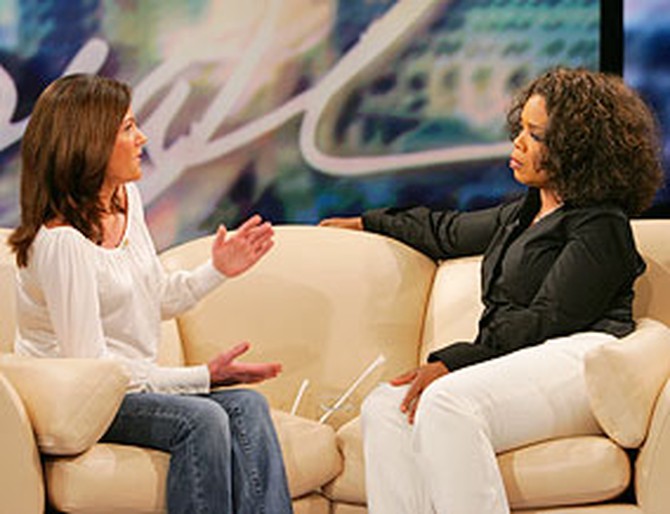
When she was working as a prostitute, Lisa says she would routinely see anywhere from three to eight men "on a good day." One of the first things Lisa says she learned was to be emotionally separated from what she was doing. Her emphasis instead was always on getting drugs.
"For the addict, it's surviving," she says. "I didn't do it because I enjoy sex. I didn't do it because I like men or anything like that. It was completely to feed my addiction ... I remember the first time with a dealer that I exchanged sexual favors for drugs."
Lisa says her clientele included business executives, athletes and many married men. "It's not the guy with the trench coat flashing people on the street," she says.
"For the addict, it's surviving," she says. "I didn't do it because I enjoy sex. I didn't do it because I like men or anything like that. It was completely to feed my addiction ... I remember the first time with a dealer that I exchanged sexual favors for drugs."
Lisa says her clientele included business executives, athletes and many married men. "It's not the guy with the trench coat flashing people on the street," she says.
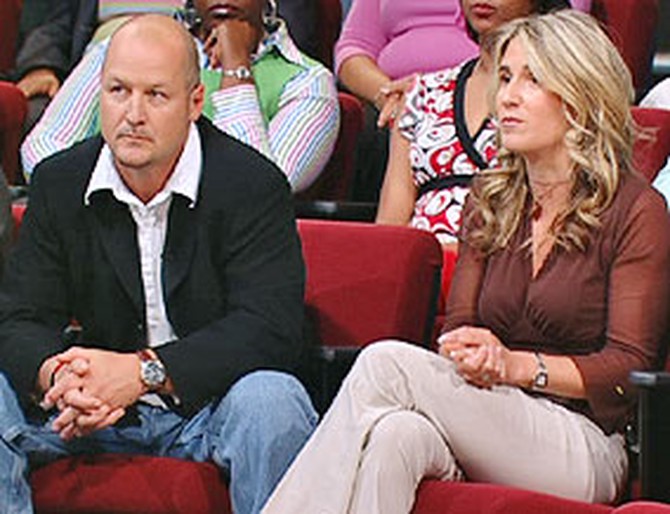
The film that literally changed Lisa's life is called Cracked Not Broken. It was filmed by Paul, the husband of Lisa's best friend, Nicol.
The idea to make the film came from Lisa herself. At a time when she was sober and not prostituting herself, Lisa was visiting Nicol. Lisa told Nicol that if she ever went back to a life of drugs and prostitution, she wanted Paul—a filmmaker—to document what that life is like.
Nicol says that Lisa thought seeing the footage might be shocking enough to get her to change her life. "At the time that was the objective," Nicol says.
"Remarkable things have happened since this film was made," Lisa says. She now speaks in schools about her experiences with addiction and prostitution.
The idea to make the film came from Lisa herself. At a time when she was sober and not prostituting herself, Lisa was visiting Nicol. Lisa told Nicol that if she ever went back to a life of drugs and prostitution, she wanted Paul—a filmmaker—to document what that life is like.
Nicol says that Lisa thought seeing the footage might be shocking enough to get her to change her life. "At the time that was the objective," Nicol says.
"Remarkable things have happened since this film was made," Lisa says. She now speaks in schools about her experiences with addiction and prostitution.
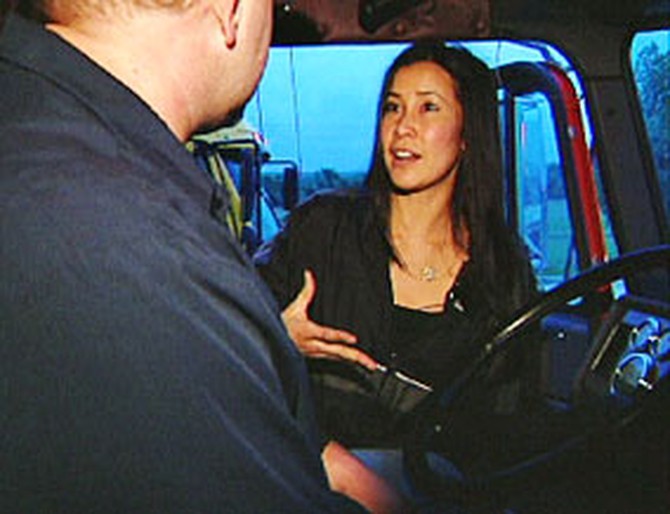
According to the FBI, the average age prostitutes begin selling their bodies is just 14 years old. Many of these young prostitutes work in places like truck stops.
Oprah Show correspondent Lisa Ling followed the Oklahoma City Police Department's vice squad on a sting to expose a hot spot of child prostitution called "Party Row."
On Party Row, the police explain, anywhere between six and 20 young girls a night walk between the trucks to solicit "dates." The truckers flash their lights to signal that they are looking for sex.
One woman who is arrested is a 19-year-old college student, who tells Lisa she sells herself to support her children. She says she doesn't count how many men she has sex with in a given night. "I already feel bad about it as it is. And then you think about how many people you've been with—it's just crazy," she says.
Despite the means in which she supports herself, the woman still dreams of getting off Party Row. "I want to be a nurse," she says. "That is what I'm going to school for, to be a registered nurse. I don't want to be a prostitute forever."
Oprah Show correspondent Lisa Ling followed the Oklahoma City Police Department's vice squad on a sting to expose a hot spot of child prostitution called "Party Row."
On Party Row, the police explain, anywhere between six and 20 young girls a night walk between the trucks to solicit "dates." The truckers flash their lights to signal that they are looking for sex.
One woman who is arrested is a 19-year-old college student, who tells Lisa she sells herself to support her children. She says she doesn't count how many men she has sex with in a given night. "I already feel bad about it as it is. And then you think about how many people you've been with—it's just crazy," she says.
Despite the means in which she supports herself, the woman still dreams of getting off Party Row. "I want to be a nurse," she says. "That is what I'm going to school for, to be a registered nurse. I don't want to be a prostitute forever."
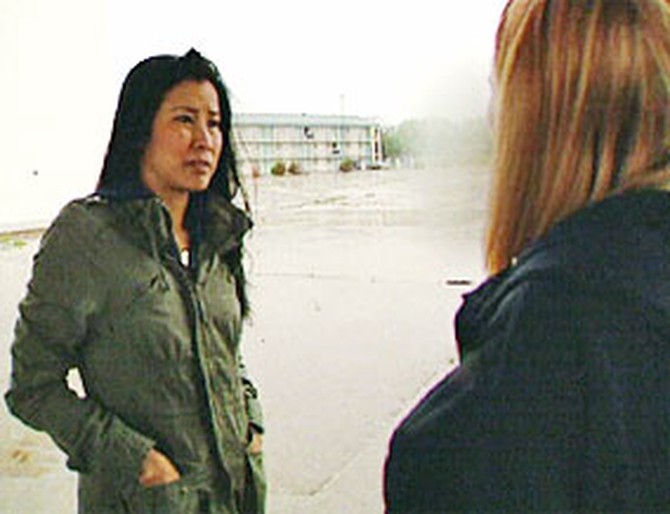
In a very candid interview, Lisa speaks with "Amber," who says she's turned countless tricks in truck stops from Oklahoma to Florida. Amber says she was a 14-year-old runaway when she began working for a pimp...on the advice of her aunt. Like an estimated 90 percent of prostitutes, "Amber" was molested as a child. In her case, she says her aunt and uncle began raping her when she was just 12 years old.
To make her quota of $1,000 every night, Amber says she sometimes had to have sex with as many as 20 men in a day. If she didn't make her quota, she says her pimp would beat her mercilessly. "I can't see straight sometimes still because of [the beatings]," she says. "My vision goes blurry and I'll see double sometimes."
Amber says she suffers from other negative effects of her life as a prostitute. "You don't feel like a person anymore," she says. "You don't feel any emotion. It takes your dignity and your self-respect, self-esteem. It strips you of it."
To make her quota of $1,000 every night, Amber says she sometimes had to have sex with as many as 20 men in a day. If she didn't make her quota, she says her pimp would beat her mercilessly. "I can't see straight sometimes still because of [the beatings]," she says. "My vision goes blurry and I'll see double sometimes."
Amber says she suffers from other negative effects of her life as a prostitute. "You don't feel like a person anymore," she says. "You don't feel any emotion. It takes your dignity and your self-respect, self-esteem. It strips you of it."
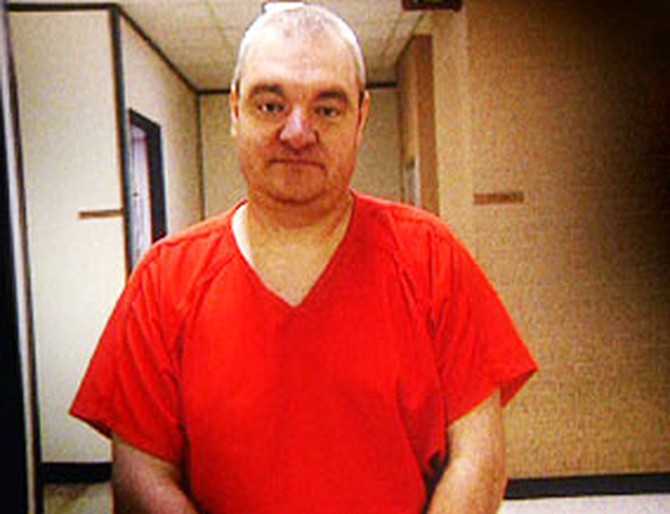
Lisa goes behind bars in Oklahoma City to meet Greg Anderson, a career criminal who's currently serving eight years for promoting prostitution. Police say Anderson was the head of a prostitution ring being run out of an Oklahoma City truck stop and had at least seven women working for him. Three of his prostitutes were 13, 14 and 15 years old. Anderson claims the girls lied about their ages, and says he didn't find out they were children until his arrest. FBI Special Agent Mike Beaver says that's highly unlikely.
"The pimps do actively recruit the young," Special Agent Beaver says. "In the subculture, the young child, sadly, brings more money, and the pimps know that."
Anderson admits that greed—not concern for the women—motivated him to become a pimp. "I wanted the money," Anderson says. "I overlooked the moral ramifications of it for their money. Families think I'm despicable."
"The pimps do actively recruit the young," Special Agent Beaver says. "In the subculture, the young child, sadly, brings more money, and the pimps know that."
Anderson admits that greed—not concern for the women—motivated him to become a pimp. "I wanted the money," Anderson says. "I overlooked the moral ramifications of it for their money. Families think I'm despicable."
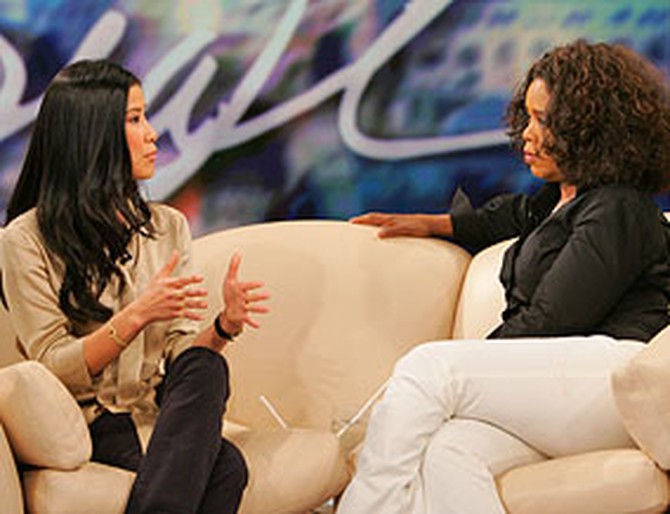
Many prostitutes—especially the women who suffered abuse as children—look at their pimp as a "father figure," Lisa says. "These pimps come along, and they offer [prostitutes] security, and they say, 'We'll take care of you. We'll take care of your kids.' So the girls often trust them. ... They'll do anything they say."
Law enforcement agents tell Lisa that when they bust pimps at their homes, they have to bring extra squad cars and child safety seats, because there are so many kids in the house. "It is sickening," Lisa says.
Oftentimes, prostitutes don't see a penny of the money they earn on the streets. Every dollar goes into the pocket of their pimp, Lisa explains. So why are so many young women becoming prostitutes? Special Agent Beaver says the glamorization of the sex industry in music and on TV contributes to the problem. "Society today, in many ways, condones it," he says. "We have little people growing up seeing that and that's what they think is acceptable."
Despite what some may think, there's nothing glamorous about prostitution. According to the Inter-Press Service, an international journalists' organization, the number one cause of death among prostitutes is murder.
Law enforcement agents tell Lisa that when they bust pimps at their homes, they have to bring extra squad cars and child safety seats, because there are so many kids in the house. "It is sickening," Lisa says.
Oftentimes, prostitutes don't see a penny of the money they earn on the streets. Every dollar goes into the pocket of their pimp, Lisa explains. So why are so many young women becoming prostitutes? Special Agent Beaver says the glamorization of the sex industry in music and on TV contributes to the problem. "Society today, in many ways, condones it," he says. "We have little people growing up seeing that and that's what they think is acceptable."
Despite what some may think, there's nothing glamorous about prostitution. According to the Inter-Press Service, an international journalists' organization, the number one cause of death among prostitutes is murder.
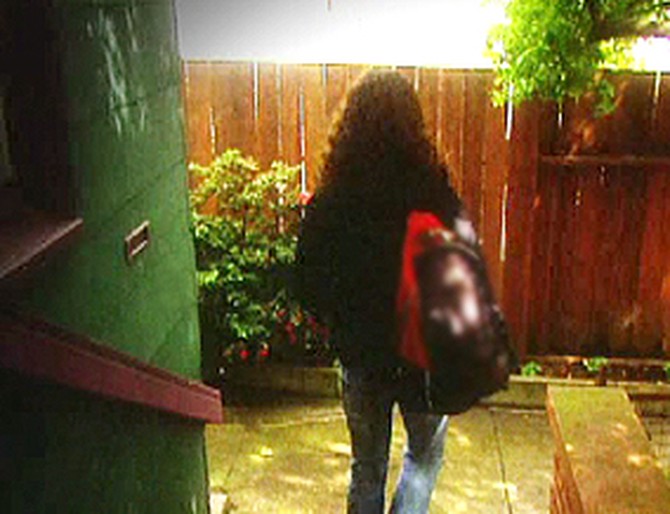
As a child, Marie lived on a tree-lined street with her family. She excelled in dance, was accepted to a prestigious arts college and dreamed of becoming a ballerina. She never imagined she'd end up on the streets, selling her body and working for a pimp.
Marie says she met her pimp at a bus stop when she was on her way home from class. The man continuously called her and finally convinced her to meet him at a local bar, where he persuaded her to try prostitution. "He told me that I was a superstar...that it would be easy for me to make a lot of money," she says. Within 24 hours of meeting with the pimp, Marie turned her first trick.
At home, Marie's mother began noticing changes in her daughter, and then, Marie disappeared from home. Her parents didn't know if she was dead or alive.
Marie says she met her pimp at a bus stop when she was on her way home from class. The man continuously called her and finally convinced her to meet him at a local bar, where he persuaded her to try prostitution. "He told me that I was a superstar...that it would be easy for me to make a lot of money," she says. Within 24 hours of meeting with the pimp, Marie turned her first trick.
At home, Marie's mother began noticing changes in her daughter, and then, Marie disappeared from home. Her parents didn't know if she was dead or alive.
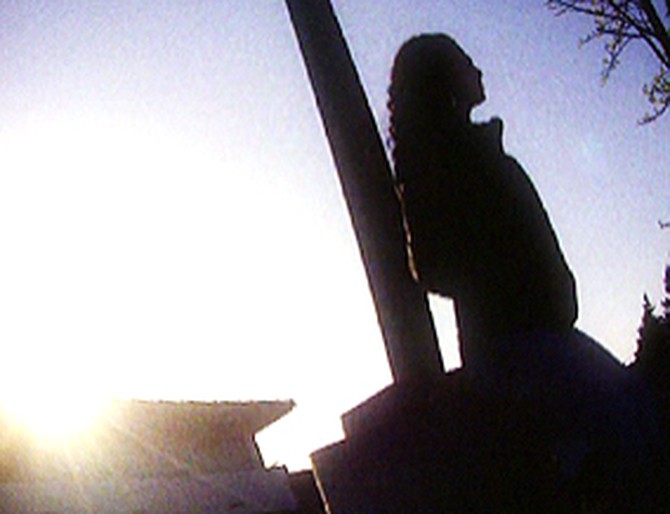
Marie says her pimp kept her on the move, moving her through three states. Every day, Marie claims she was given a quota and turned up to 12 tricks a day.
When her pimp became violent, Marie got the courage to leave and returned home to her family. She was on the streets for eight months and estimates that she had sex with 300 people.
Marie's mother says she hopes their story will be a warning to parents. "When you come from a family like ours, prostitution isn't even something that you would even think about would happen," she says. "If it can happen to our family, it can happen to anybody."
When her pimp became violent, Marie got the courage to leave and returned home to her family. She was on the streets for eight months and estimates that she had sex with 300 people.
Marie's mother says she hopes their story will be a warning to parents. "When you come from a family like ours, prostitution isn't even something that you would even think about would happen," she says. "If it can happen to our family, it can happen to anybody."
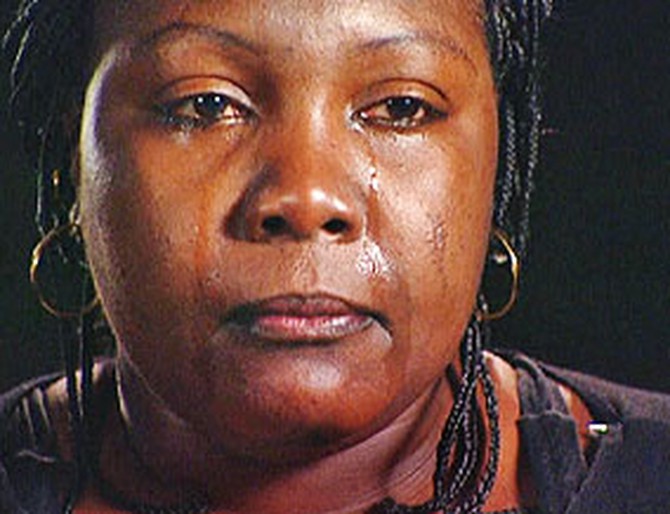
Contessa is a mother of five who never imagined that she would end up selling her body to strangers. "Before the drugs and prostitution, I was happy," she says. "Life was going really well."
When Contessa's husband left her, she says she started abusing drugs and turned to prostitution to support her crack habit. "I felt what I was doing was wrong," she says. "But I couldn't stop."
The dark side of prostitution made life on the streets a never-ending nightmare. Contessa says she was raped twice, sliced across the face and stabbed with an ice pick while turning tricks. "After a while, the family stopped showing up at the hospital because I think they were getting tired of it," she says. "When they stopped showing up, I knew I had nothing, nobody."
When Contessa's husband left her, she says she started abusing drugs and turned to prostitution to support her crack habit. "I felt what I was doing was wrong," she says. "But I couldn't stop."
The dark side of prostitution made life on the streets a never-ending nightmare. Contessa says she was raped twice, sliced across the face and stabbed with an ice pick while turning tricks. "After a while, the family stopped showing up at the hospital because I think they were getting tired of it," she says. "When they stopped showing up, I knew I had nothing, nobody."
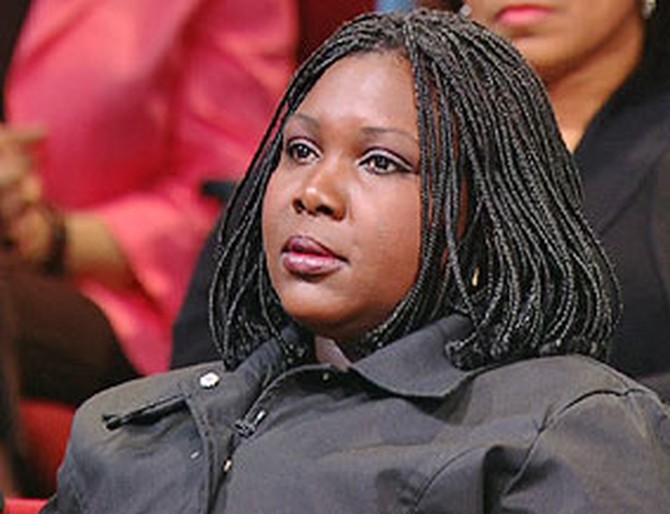
After working as a prostitute for almost two years, Contessa says her turning point came when a man put a gun to her head. "That's when I knew I had to stop," she says. "I just saw myself getting shot. I knew my prayers didn't work any more."
Contessa says it's been two years since she stopped prostituting herself. Now, Contessa is working with PRIDE, a non-profit organization in Minneapolis, Minnesota, that helps women get out and stay out of prostitution. She has a job and a place to live, but she can't let go of her past. "I don't feel clean yet," she says. "I feel like a dirty person all the time. ... They have just used me up so much. They turned me into nothing."
Contessa says it's been two years since she stopped prostituting herself. Now, Contessa is working with PRIDE, a non-profit organization in Minneapolis, Minnesota, that helps women get out and stay out of prostitution. She has a job and a place to live, but she can't let go of her past. "I don't feel clean yet," she says. "I feel like a dirty person all the time. ... They have just used me up so much. They turned me into nothing."
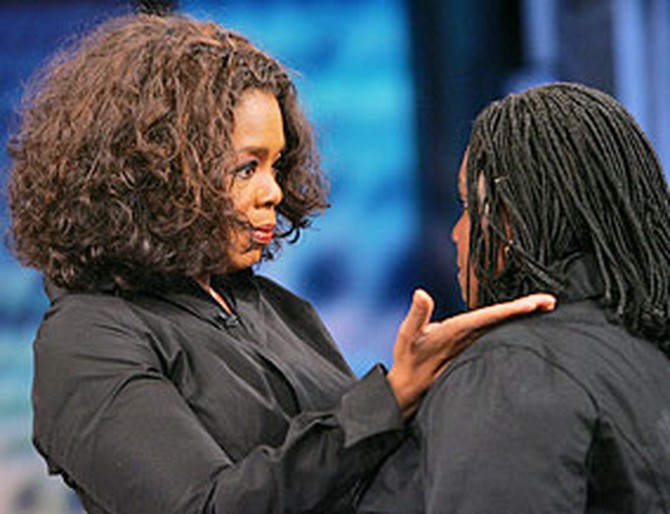
Oprah tells Contessa that she is not all used up, and she must have faith in herself to move on and begin a new life.
"If you believe yourself, as you've told the world today, that you're all used up, then your life will be," Oprah says. "There's nothing else that could ever possibly happen that would bring you joy, that would bring you meaning, that would bring you a sense of fulfillment if that is what you believe. You become what you believe. ... God has great plans for you. Great things will happen to you in your life."
When Oprah looks into Contessa's eyes, she says she sees herself. "When I was 14 years old, I was running the streets," she says. "And there but for the grace of God, if my father hadn't taken me in, I could have been you or any one of the girls here."
"If you believe yourself, as you've told the world today, that you're all used up, then your life will be," Oprah says. "There's nothing else that could ever possibly happen that would bring you joy, that would bring you meaning, that would bring you a sense of fulfillment if that is what you believe. You become what you believe. ... God has great plans for you. Great things will happen to you in your life."
When Oprah looks into Contessa's eyes, she says she sees herself. "When I was 14 years old, I was running the streets," she says. "And there but for the grace of God, if my father hadn't taken me in, I could have been you or any one of the girls here."
Published 05/08/2006

